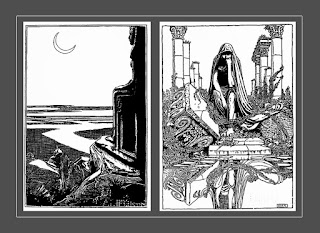The Poe Outro
In pop music, an “outro” is the concluding segment of a song—the word is made up from the opposite term, an intro, which is the introductory portion: it can be a guitar riff, a distinctive drumbeat, or a combination of similar elements. The introduction to Beethoven’s Fifth (or Symphony No. 5 in C minor) has been called “the most famous four notes in music history” and you can probably hear the ‘ta-ta-ta-tum’ in your head as you read this. (It said “saxo-mo-phone,” to Homer Simpson.)
In the world of pop music, the Beatles were prone to writing memorable outros in songs like “Hey Jude” (‘Na, na, na-na, na-na,’ etc.), “Drive My Car” (‘Beep-beep ‘n beep-beep, yeah’) and “Ticket to Ride” (‘My baby don’t care’). All of these outros switched gears from the verse-chorus-verse-chorus pattern that preceded them into a repetitive loop that was intended to fade out as the song ended. That same idea—a repetitive pattern that takes us out of the pattern set up in the main body—was employed by Edgar Allan Poe in several of his poems, which are known to have exhibited high musicality, to begin with.
The loop could be short, like in “Annabel Lee” (1849):
In her sepulchre there by the sea—
In her tomb by the sounding sea.
Note the repetition with just a slight variation. Trademark Poe. Or it could be longer, like in “The Bells” (1849):
Keeping time, time, time,
In a sort of Runic rhyme,
To the throbbing of the bells—
Of the bells, bells, bells—
To the sobbing of the bells;
Keeping time, time, time,
As he knells, knells, knells,
In a happy Runic rhyme,
To the rolling of the bells—
Of the bells, bells, bells—
To the tolling of the bells,
Of the bells, bells, bells, bells—
Bells, bells, bells—
To the moaning and the groaning of the bells.
Long or short, outros were a recurring device for Poe in poems such as “For Annie” (1849), “Dream-Land” (1844—though here, the outro simply repeats the intro), “Eulalie” (1843), and “Lenore” (1843).
These poems will leave you bopping along to the meter after you’ve put the book down.




Comments
Post a Comment